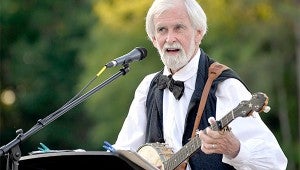MUSIC AND WAR: Horton brings music, history to amphitheater
Published 3:00 am Friday, April 29, 2016

photo courtesy troy university
Bobby Horton, a multi-instrumentalist and music historian, entertained at the amphitheater at Janice Hawkins Park this week. His unique presentation interwined music and history.
Tuesday night was a very special time at Troy University.
Bobby Horton, a multi-instrumentalist and music historian, presented the opening concert at the amphitheater at Janice Hawkins Park with a larger number of students and community members in attendance.
Chancellor Dr. Jack Hawkins, Jr. said the concert was one of many concerts and events to be held at the amphitheater that was inspired by the Gerald R. Ford Amphitheater in Vail, Colorado.
Hawkins and Horton have been friends for about 45 years and Hawkins had nothing but praise for his longtime friend.
“Bobby Horton has a love of history and of music,” Hawkins said. “He has done Civil War research and has14 volumes of battlefield songs. He has provided music for Ken Burns’ films and PBS and National Park Service documentaries.
“If you love music, you’ll love Bobby Horton. If you love history, you’ll love Bobby Horton. If you don’t love music or history, you’ll still love Bobby Horton.”
Horton said his lifelong passion for music began at an early age and when most of the men in his life were World War II veterans.
“I both feared them and revered them,” Horton said of those men of war. “My father served in North Africa. He found himself in a desert somewhere and thought he would never get home.”
Horton said his father became depressed and it was music that brought him out of that state of mind.
“My father had a friend who put a radio together out of spare parts,” Horton said. “The first sounds from that radio were Glenn Miller’s ‘In the Mood’ on BBC. Hearing my father’s story and the effect it had on him, I realized the importance of music. After that, I’ve never taken the importance of music for granted.”
When Horton was nine years old, the United States celebrated the Centennial of the Civil War. The celebration brought the Civil War to the forefront of his interest and his love of history became deeply rooted.
The focus of Horton’s love of history and love of music is the Civil War. He developed an appreciation for “common men” who fought for a cause they believed to be just.
Horton said, in 1860 there were 30 million people in United States. By the end of 1865 750,000 were known dead.
“And they were all Americans,” Horton said.
“With all of the carnage of war around them, these men – from the North and from the South — had little to see them through except their faith and music,” Horton said.
The “companies” of soldiers were made up of men from the same hamlets. They were fathers, sons and brothers. They were cousins and friends.
As the ‘civil’ war developed, the same story took place all across the nation.
“Women would make flags for their boys who were going off to war saying, ‘Bring the flag back or not at all.’ The women would be crying, the children would be crying and so would the ‘boys’ who had never been no more than 12 miles from home.”
Horton said if a soldier had an instrument and could play it, he took it with him to war.
At night, around the campfires, the men played music and sang songs. Many songs were “composed” campfires and more were written about the war, its heroes, about death and dying.
During the Civil War, Horton said people were eager to buy sheet music that told the stories of the war. Thousands of songs were written and many thousands of copies of sheet music were sold.
Horton shared music that told of battles, of flags, of heroes and of the roles women played in the Civil War.
He said at times, when no officers were around, the men from the North and the South would put their weapons and meet on common ground.
“They were common men,” he said. “All wars are fought by common men.”



